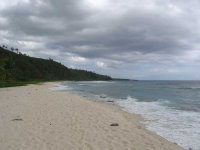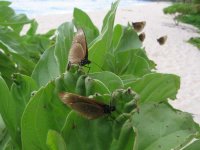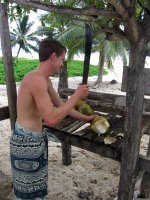 Maka lives with Papa's pulenu'u (town mayor). One of the first orders of business after his arrival was the construction of his fale. Maka and twenty or so untitled men built the small one person fale in two days. With this out of the way, Maka was able to start working on his two year project, focusing on sustainable crops and agricultural techniques for use within the village. In the year that he's been in Papa he's built a small nursery and a large garden which provide the clippings and seeds he needs to help other families within the village develop more robust farming practices. He has a range of different crops growing successfully including three types of basil, spinach, sweet potato vine, three types of tomato and watermelon.
Maka lives with Papa's pulenu'u (town mayor). One of the first orders of business after his arrival was the construction of his fale. Maka and twenty or so untitled men built the small one person fale in two days. With this out of the way, Maka was able to start working on his two year project, focusing on sustainable crops and agricultural techniques for use within the village. In the year that he's been in Papa he's built a small nursery and a large garden which provide the clippings and seeds he needs to help other families within the village develop more robust farming practices. He has a range of different crops growing successfully including three types of basil, spinach, sweet potato vine, three types of tomato and watermelon.After a brief tour of his gardens we hopped in the car and drove down the (rocky dirt) road to a secluded beach. The land is owned by a matai of Papa village but he doesn't use it too much. He's allowed to let Maka head down there whenever he likes. In essence, Maka has his own private beach!
 It was a little windy and overcast when we arrived but still beautiful. We had a wander along the beach and chatted away. We came across a plant which was covered in butterflies. Maka told us that the sap of the plant was what attracted the butterflies and to demonstrate the point he used his machete to hack away the tips of the leaves. Within seconds the butterflies went crazy and swarmed over them.
It was a little windy and overcast when we arrived but still beautiful. We had a wander along the beach and chatted away. We came across a plant which was covered in butterflies. Maka told us that the sap of the plant was what attracted the butterflies and to demonstrate the point he used his machete to hack away the tips of the leaves. Within seconds the butterflies went crazy and swarmed over them.Whilst we watched the butterflies Maka headed off to a nearby coconut tree and hacked away until he'd brought four coconuts down. He then showed us how to prepare coconuts for drinking. I've done this before with a large stick and husked them that way, but this was the first time I've seen it done solely with a machete. Two of the coconuts were niu - young drinking coconuts - and two were popo, the older coconuts good for the meat. After we drank the two niu, Maka used his machete to make a spoon from the remaining husk of the niu and then chopped them in half so we could scoop out and enjoy the young jelly-like meat. Very tasty indeed.
 Maka leads a very different life to ours in Apia. His resources are considerably more limited but his experience is far more in line with the majority of Samoans. One of the most profound differences is that of our language skills. Listening to Maka converse freely with his host family was illuminating. The Peace Corps program begins with three months of fairly intensive language lessons. By comparison, we have five hours of lessons. I couldn't help but feel a little envious. That said, if I was really serious about picking up the language I'd have arranged private lessons and pushed myself much harder. Maybe next time.
Maka leads a very different life to ours in Apia. His resources are considerably more limited but his experience is far more in line with the majority of Samoans. One of the most profound differences is that of our language skills. Listening to Maka converse freely with his host family was illuminating. The Peace Corps program begins with three months of fairly intensive language lessons. By comparison, we have five hours of lessons. I couldn't help but feel a little envious. That said, if I was really serious about picking up the language I'd have arranged private lessons and pushed myself much harder. Maybe next time.A little while after we finished off the coconuts we drove back to Maka's fale and said our farewells. Our day was still young and we had more ground to cover before stopping for the day. Our next stop would be the village of Manase where an afternoon of relaxation awaited us.
No comments:
Post a Comment